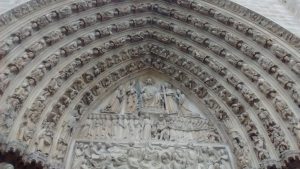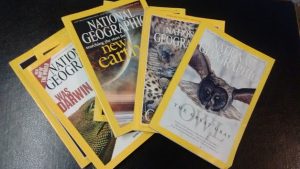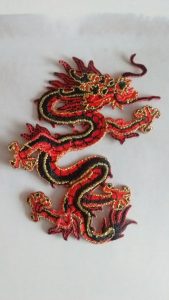This Week’s Bit of String: Tidying up the building materials
Once when my son was about six years old, I looked in on him during his evening tidy-up to see him gloomily tossing his Lego into their bucket, punctuating their impact with sighs. ‘What’s up?’ I asked.
‘Oh, I’m just…angry at God.’
He explained his grievance to me: ‘While we were eating dinner, I asked God really nicely if he would please tidy up my room for me.’ Another sigh. ‘But He didn’t.’
I’d seen him in a similar predicament with the magic wand he’d received for his birthday. And when he was a toddler, just learning his manners, there were those agonised epiphanies that saying please—‘the magic word’—won’t get you extra sweets or a later bedtime.
So it didn’t seem the time to put God’s existence under review, anymore than I would tell him there’s no such thing as magic. ‘Sorry, mate. I don’t think He works that way; He likes to make sure we know how to do things for ourselves.’
Losing My (Bias Against) Religion
Religion—and, well, not relying too exclusively on it—has enmeshed itself into a few of my stories. In Artefacts, the first novel I wrote, talking about God embarrasses the protagonist, ‘like talking about someone and suddenly realising they stood behind you.’
I feel that way, a bit, penning scenes with God in my current novel. As it’s Eve’s story, though, and her family’s, He plays a prominent role. I guess it’s the first time I’ve written about a recognisable figure, an entity Who might (who knows?) actually exist. That changes things, doesn’t it?

Last week I wrote about reimagining the first humans in the Bible, as well as the angels, trying to de-stigmatise as far as possible. These days, at least in our fast-paced, ‘enlightened’ society, it seems God too has become somewhat stigmatised, the focus of blame and skepticism rather than adoration. I don’t want to get caught up in that, even while sympathising with Eve and other characters He punished.
One has to wonder, if God does exist, and is by definition omnipotent and eternal, do all our pleas and tirades sound to Him like a child not wanting to pick up his own toys? I’m trying not to be restricted by pro-human bias in my view.
He’s Got the Look
So far I’ve not gone into great detail about God’s appearance. That’s not the done thing, is it? In our art we tend to come at physical description obliquely, if at all. Likewise with my re-invented angels, apart from the odd mention of their scales, wings, and fire. The humans in the story accept these beings and have no reason to overtly describe them.

There’s mention of God’s immense size, and lack of clear outline. I mean, He’s God. We can be justified in thinking he has humanoid aspects (or commonly manifests them), because He does say He’s made people in His image. But I don’t think He’s just a muscly older man with a flowing white beard, the way Michelangelo depicted Him.
For one thing, He’s not going to have a corporeal body. He’s energy, and why He would choose to generally have a human form, I don’t know. I suppose it has its uses, a certain organisation and compactness. But in my work there’s a glow to Him and a deep, shifting substance that defies boundary. His eyes can turn into oceans, His smile into sunrise.
The King (of King)’s Speech
What I have God say in the book is far more important than how He looks. And I haven’t a whole lot of source material to base it on. I’m not on board with the whole divine scriptures idea. Sorry, I’m a writer myself. I know how easy it is to make stuff up and then it feels like canon in my mind. That doesn’t mean it is. That’s possibly my human bias talking, but for the purposes of this project, I’m going with it.
I’m drawing the line at accepting God’s actual words as relayed in Genesis—but weeding out ideas that are merely imputed to Him.
For example, when He punishes Cain for killing Abel, He says Cain is exiled and will lose his knack for growing crops. He never says Cain is banished from His presence (that would be admitting some limitation to His power). It’s Cain who moans that he’ll be out of God’s sight, and then the narrative picks it up.
Granted, He issues curses at key moments, but He doesn’t just pronounce judgment. He questions those involved, giving them a chance to explain themselves or at least ‘fess up—all the while opening Himself to even more disappointment as they flounder around pretending they didn’t do that thing they really weren’t supposed to do.
He strikes me as part Albus Dumbledore, part Atticus Finch, giving people space and a bit of prodding to see if they’ll figure things out for themselves. Here, Eve’s daughter Ana recounts to Cain how God encouraged her to start her own family, while admitting she too would carry her mother’s curse.
‘So I told Him: “I think You are a brutal Master.”’
Cain gave me one of his rare, full-on looks, allowing me to see the Mark. ‘Then what?’
‘He said, “Well, at least you believe I’m your Master.”
“What choice do I have?” I asked. ‘You gave my parents life out of dust and bone.’
“You have every choice, Ana. You and all your future children and grandchildren, you have a choice.” And His glow seemed to dim slightly. I almost felt sorry for him.’
After all, I feel a certain sympathy with Him, too. Creating people, letting them bumble off on their way doing what they like, forcing You to spring up obstacles in their path to slow them down and get them to look about themselves for once…Ahem. Yes. Perhaps God and us writers have a thing or two in common. What do you think?




